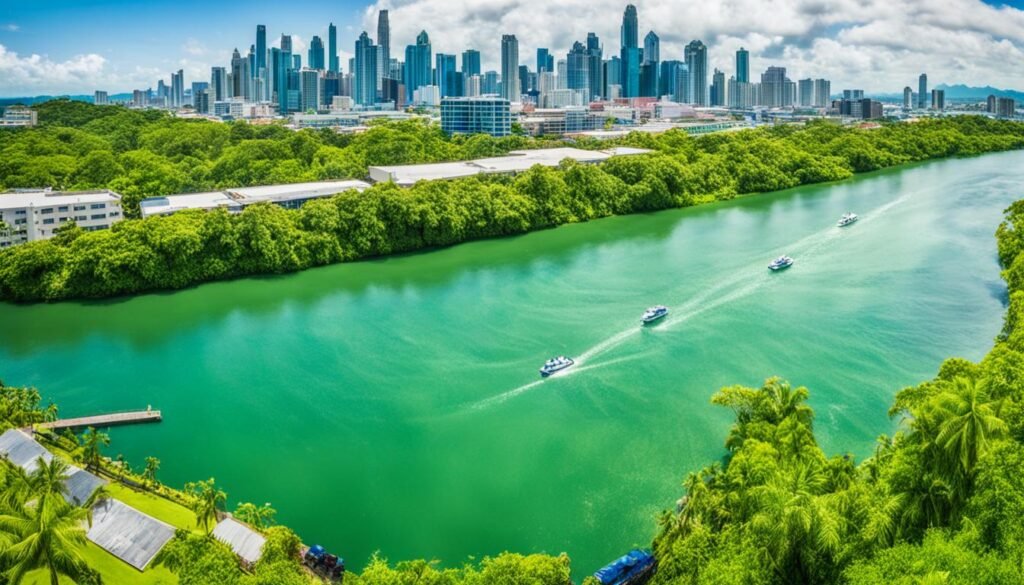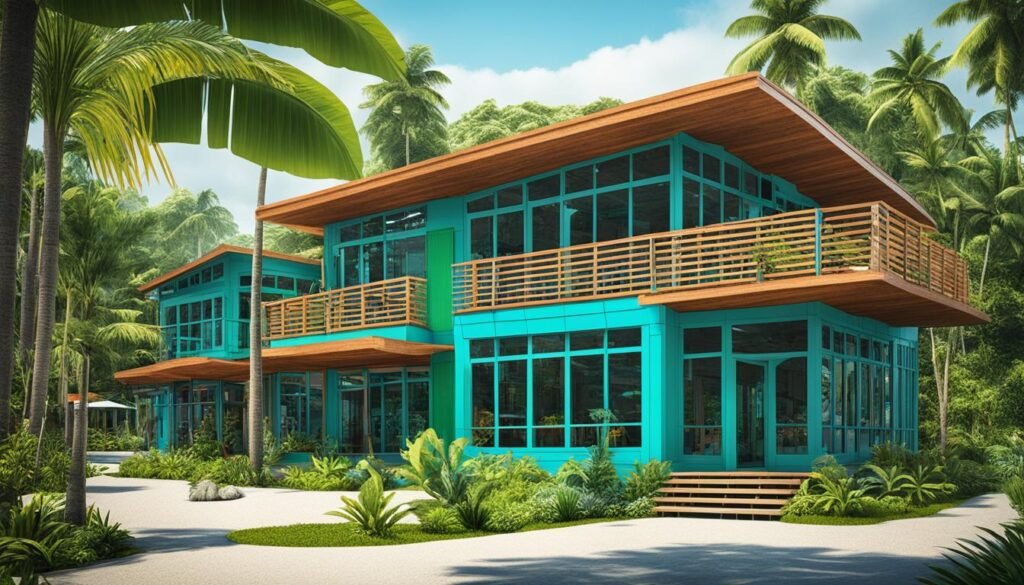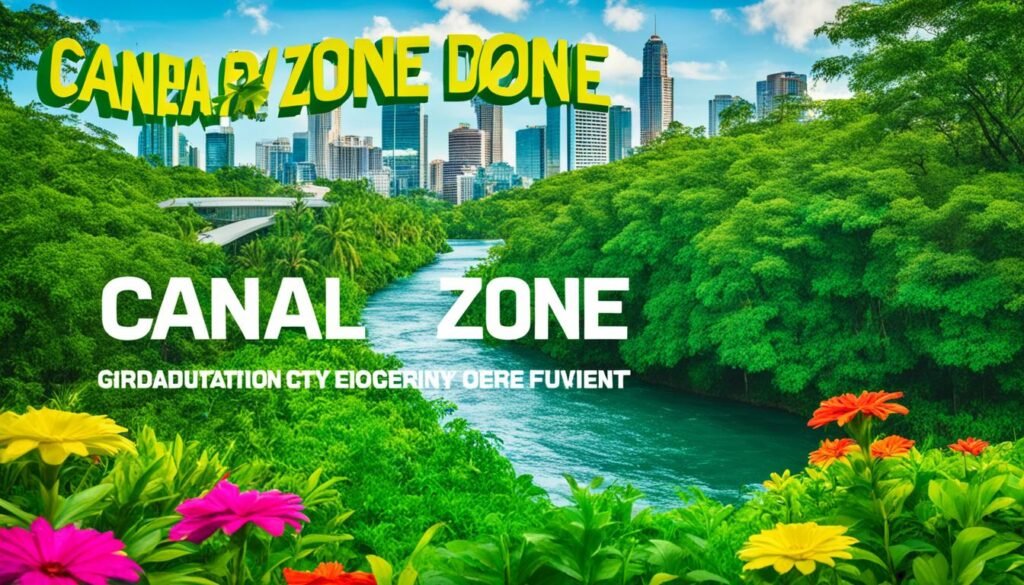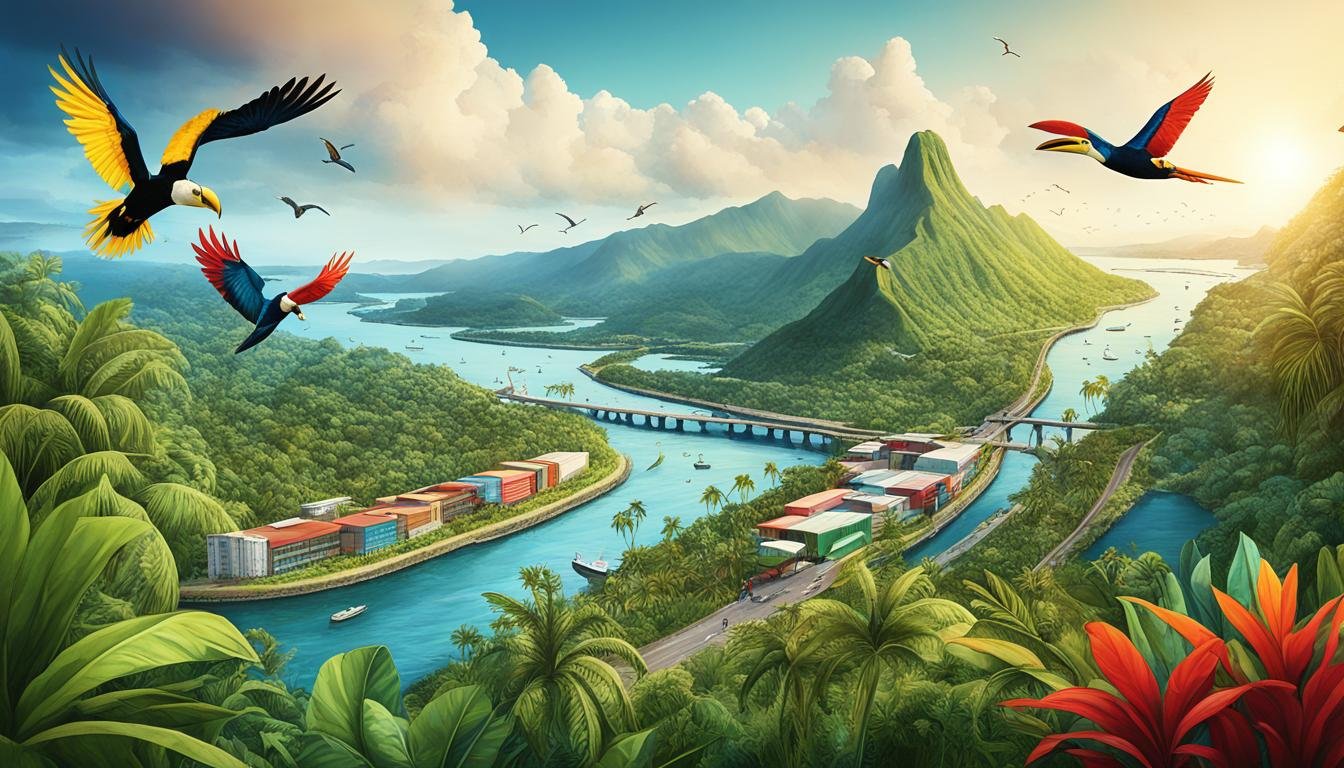Did you know that Panama’s canal zone is home to one of the most biodiverse ecosystems on the planet? The Continents States University in the United States offers a cutting-edge canal zone ecology degree program in Panama City, providing students with unparalleled opportunities to explore and protect this remarkable natural treasure.
Key Takeaways
- Immersive study of tropical ecosystems, including rainforests, coral reefs, and mangrove forests
- Hands-on research and conservation projects in the Panama Canal watershed
- Focus on sustainable practices and ecotourism in Panama’s diverse habitats
- Opportunities for community engagement and collaboration with local organizations
- Flexible, competency-based program designed for career advancement
Study Abroad in Panama’s Biodiverse Ecosystems
Panama is a haven for environmental enthusiasts, boasting an incredible diversity of ecosystems ripe for exploration. The canal zone ecology degree program in Panama City offers students a unique opportunity to immerse themselves in the country’s tropical wonders. Over the course of seven weeks, learners will conduct field studies in five distinct settings across Panama and Costa Rica, honing essential skills in environmental research and conservation.
Highlights of Studying Ecology in Panama
From estimating forest biodiversity to evaluating coral reef health, students will gain hands-on experience in cutting-edge ecological techniques. They’ll also have the chance to identify tropical fish species, quantify neotropical mammal abundance, and calculate the carbon stored in mangrove forests. The program culminates in four weeks of independent field research, where students can dive deep into a topic of their choice, contributing to the growing body of knowledge on Panama’s biodiverse ecosystems.
Whether your passion lies in environmental studies, tropical ecology, biodiversity conservation, or sustainable tourism, this program offers a unique opportunity to immerse yourself in the heart of Panama’s natural wonders. Explore rainforest conservation, Panama Canal wildlife, and marine biology in one of the world’s most ecologically diverse regions.
The Bocas del Toro Archipelago: A Living Classroom
The Continents States University’s canal zone ecology degree program is centered in the diverse environments of the Bocas del Toro archipelago, a tropical island paradise off the Caribbean coast of Panama. These islands and surrounding waters offer an unparalleled living classroom for students to explore coral reefs, mangrove forests, sandy beaches, and lush rainforests.
Explore Coral Reefs, Rainforests, and Island Life
Through hands-on courses and field research, students in the environmental studies Panama and tropical ecology Panama programs dive deep into the incredible biodiversity of this region. They snorkel among the vibrant coral reefs, home to a vast array of marine life, and hike through the rainforest-covered islands in search of endemic birds, monkeys, and other wildlife. The Bocas del Toro archipelago offers a unique opportunity to study the complexities of biodiversity conservation Panama and sustainable tourism Panama firsthand.

The diverse ecosystems of the Bocas del Toro archipelago also provide an ideal living laboratory for students pursuing degrees in marine biology Panama and ecotourism Panama. They can investigate the impacts of climate change, pollution, and human activities on the delicate balance of these tropical island environments, contributing to critical research on rainforest conservation Panama and the preservation of the Panama Canal watershed.
Panama: Canal zone ecology degree Panama City Panama
Nestled in the heart of Central America, Panama offers a unique educational opportunity for students seeking to explore the wonders of tropical ecology. The Continents States University’s canal zone ecology degree program in Panama City provides an immersive experience, allowing students to delve into the intricacies of this biodiverse and complex ecosystem.
The program’s curriculum encompasses a wide range of environmental studies, from tropical ecology and biodiversity conservation to sustainable tourism and rainforest preservation. Through extensive field studies, students gain hands-on experience in observing and documenting the diverse flora and fauna that thrive within the Panama Canal watershed, including the iconic wildlife of the region.
Beyond the classroom, the canal zone ecology degree program encourages collaborative research projects and partnerships with local organizations, addressing critical environmental issues such as the impact of climate change and sustainable management of the Panama Canal’s resources. This interdisciplinary approach equips students with the knowledge and skills needed to tackle real-world challenges and contribute to the conservation and preservation of Panama’s unique ecosystems.

Whether your interests lie in marine biology, ecotourism, or tropical ecology, the canal zone ecology degree program in Panama City offers a transformative educational experience. Immerse yourself in the vibrant culture, explore the captivating biodiversity, and become a steward of sustainable environmental practices in one of the world’s most remarkable natural wonders.
The Center: Your Home Base in Bocas del Toro
Nestled among the stunning Bocas del Toro archipelago, the Continents States University’s canal zone ecology degree program is centered at “The Center” – a unique campus hub that serves as the heart of student life and learning. Formerly a hotel, this vibrant facility now caters to the needs of those pursuing environmental studies in Panama, tropical ecology, biodiversity conservation, and sustainable tourism.
Located on the picturesque Isla Colón, The Center provides dorm-style accommodations, indoor and outdoor classrooms, a spacious student lounge, on-site dining options, and direct access to the warm waters and palm-fringed shores. This ideal setting allows students to immerse themselves in the rich rainforest conservation and Panama Canal wildlife that defines this remarkable region.

Whether snorkeling the vibrant coral reefs, kayaking through the mangroves, or simply relaxing in the serene outdoor spaces, The Center provides the perfect ecotourism and marine biology experience for students pursuing their canal zone ecology degree in Panama City, Panama.
Program Costs and Financial Aid
Pursuing the canal zone ecology degree at Continents States University’s Panama City campus is an invaluable investment in your academic and personal growth. The program’s comprehensive costs cover a range of essential expenses, including pre-departure advising, tuition and research fees, housing and meals, field excursions, and 24/7 support. While this may seem like a significant undertaking, the university is committed to making its environmental studies Panama programs accessible to students from diverse backgrounds.
To that end, Continents States University awards a generous amount of need-based financial aid each year, which can include a combination of scholarships, grants, and low-interest loans. Students are also encouraged to explore additional funding opportunities through their home institutions and external organizations focused on tropical ecology Panama, biodiversity conservation Panama, sustainable tourism Panama, rainforest conservation Panama, or related fields.

The university’s commitment to supporting students’ academic pursuits and their exploration of Panama’s rich ecosystems, from the marine biology Panama to the Panama Canal wildlife, reflects its dedication to nurturing the next generation of ecotourism Panama leaders and environmental stewards.
Collaborative Research and Community Partnerships
The canal zone ecology degree program at Continents States University in Panama City is committed to fostering robust learning and research opportunities for students through collaborations with a diverse array of organizations, community groups, and government agencies. One of the program’s featured partners is the City of Knowledge (Ciudad del Saber), a private, non-profit Panamanian organization that serves as an innovative community for entrepreneurs, scientists, and experts to develop initiatives that trigger social change.
By engaging with local partners like the City of Knowledge, students pursuing the canal zone ecology degree or environmental studies in Panama can contribute to shared goals and explore the environmental challenges facing the country’s vibrant communities. This collaborative approach allows students to apply their knowledge of tropical ecology, biodiversity conservation, and sustainable tourism in real-world settings, strengthening their understanding of the complex issues surrounding rainforest conservation, Panama Canal wildlife, and marine biology in the region.
Engaging with Local Organizations and Initiatives
Through the canal zone ecology degree program, students have the opportunity to collaborate with a wide range of local organizations and community-driven initiatives in Panama. These partnerships enable students to gain hands-on experience in ecotourism, biodiversity monitoring, and environmental education, while also contributing to the sustainable development of the country’s natural resources and ecosystems.
By working alongside Panamanian experts and community leaders, students can deepen their understanding of the unique challenges and opportunities inherent to tropical ecology, rainforest conservation, and marine biology in the region. This interdisciplinary approach prepares students to become effective advocates and stewards of the country’s remarkable biodiversity, ultimately supporting the long-term sustainability of Panama’s natural wonders.
Meet the Faculty: Experts in Tropical Ecology
The Continents States University’s canal zone ecology degree program in Panama City is led by a team of experienced faculty members who are experts in the field of tropical ecology. This includes Associate Professor Leon Mach, PhD, who specializes in environmental studies and socioeconomic values, and Resident Lecturer Daniel Medina, PhD, who focuses on rainforest conservation and resource management.
These passionate and knowledgeable instructors are dedicated to providing students with a transformative educational experience and supporting them in the pursuit of their academic and research goals. Through hands-on field work, lectures, and collaborative projects, they aim to equip students with the skills and knowledge needed to thrive in the biodiversity conservation and sustainable tourism sectors in Panama and beyond.
Professor Mach’s research explores the intersection of Panama Canal wildlife and local communities, examining the socioeconomic implications of ecotourism and conservation initiatives. Meanwhile, Dr. Medina’s expertise in marine biology and tropical forest ecology informs his work on landscape-scale research projects, such as the Agua Salud initiative in the Panama Canal watershed.
Together, this dynamic faculty team ensures that students enrolled in the canal zone ecology degree program in Panama City receive a well-rounded and immersive educational experience, grounded in the latest research and best practices in the field of tropical ecology.
The Agua Salud Project: Landscape-scale Research
Nestled within the Panama Canal Watershed, the Agua Salud Project is a groundbreaking 700-hectare research initiative that offers students in the canal zone ecology degree program at Continents States University a unique opportunity to explore the intricate dynamics of this tropical ecosystem. As one of the clearest examples of ecosystem services in action, the Agua Salud Project aims to understand how various land use practices, from intact forests to cattle ranches, impact the provision of crucial environmental benefits in the region.
Exploring the Panama Canal Watershed
Through the Agua Salud Project, students in the environmental studies Panama or tropical ecology Panama programs can delve into the hydrology, carbon sequestration, biodiversity restoration, and disease ecology of the Panama Canal Watershed. This landscape-scale research allows them to gain a comprehensive understanding of the interconnected processes that sustain the region’s rich biodiversity conservation and sustainable tourism opportunities.
By engaging with the Agua Salud Project, students can contribute to the ongoing efforts to rainforest conservation Panama and the protection of the Panama Canal’s unique Panama Canal wildlife. This hands-on experience in marine biology Panama and ecotourism Panama further solidifies their understanding of the intricate relationships between land use, ecosystem services, and sustainable development in the region.
Resources and Facilities at Agua Salud
The Agua Salud Project, a vital component of the Canal Zone Ecology Degree program in Panama City, Panama, provides students with access to a diverse array of research resources and facilities. This project, situated within the Panamanian tropics, offers a unique opportunity for students to explore the region’s rich environmental studies, tropical ecology, and biodiversity conservation.
At the heart of the Agua Salud Project lies a network of experimental catchments that encompass a wide range of land use types, from near-mature rainforest conservation to managed sustainable tourism plantations and Panama Canal wildlife ranches. These catchments serve as living laboratories, allowing students to delve into the intricate dynamics of ecotourism Panama and marine biology Panama.
The project also maintains a sophisticated system for collecting hydrological data, providing students with hands-on experience in understanding the canal zone ecology degree Panama City Panama and its role in the region’s biodiversity conservation. Additionally, the Agua Salud Project hosts a primary meteorological station, enabling researchers to gather valuable insights into the local climate and its impact on the surrounding ecosystems.
For visiting researchers, the Agua Salud Project offers basic accommodations, with the Smithsonian Tropical Research Institute’s Tupper Center headquarters in Panama City serving as the primary base of operations. This seamless integration of field-based research and institutional support creates a dynamic and enriching learning environment for students pursuing their environmental studies Panama and tropical ecology Panama goals.
Conclusion
The Continents States University’s canal zone ecology degree program in Panama City offers a transformative study abroad experience, immersing students in the captivating biodiversity and complex environmental challenges of the tropics. Through hands-on field research, independent projects, and collaborative partnerships, learners develop expertise in areas like forest biodiversity, coral reef health, mangrove carbon sequestration, and sustainable resource management.
By exploring the Panama Canal watershed, rainforests, and marine ecosystems of this dynamic region, students gain invaluable global perspectives and the skills needed to address critical environmental issues and contribute to a more sustainable future. Whether their interests lie in tropical ecology, biodiversity conservation, sustainable tourism, or marine biology, this program provides an unparalleled opportunity for transformative learning and growth.
Ultimately, the canal zone ecology degree in Panama City empowers the next generation of environmental stewards, equipping them with the knowledge, experience, and network to drive positive change in the ecotourism, rainforest conservation, and Panama Canal wildlife sectors, and beyond.
Source Links
- Fall 2024: Panama: Tropical Ecology, Marine Ecosystems, and Biodiversity Conservation – SIT Study Abroad – https://studyabroad.sit.edu/program/fall-2024-panama-tropical-ecology-marine-ecosystems-and-biodiversity-conservation/
- Tropical Island Biodiversity Studies – School for Field Studies – https://fieldstudies.org/center/panama/
- Agua Salud – https://stri.si.edu/facility/agua-salud


